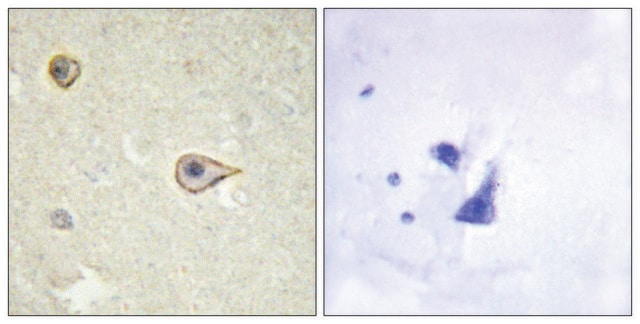SAB4502441
Anti-TMEPA antibody produced in rabbit
affinity isolated antibody
Synonyme(s) :
Solid tumor-associated 1 protein
About This Item
Produits recommandés
Source biologique
rabbit
Conjugué
unconjugated
Forme d'anticorps
affinity isolated antibody
Type de produit anticorps
primary antibodies
Clone
polyclonal
Forme
buffered aqueous solution
Poids mol.
antigen 31 kDa
Espèces réactives
human
Concentration
~1 mg/mL
Technique(s)
ELISA: 1:20000
immunofluorescence: 1:100-1:500
immunohistochemistry: 1:50-1:100
western blot: 1:500-1:1000
Numéro d'accès NCBI
Conditions d'expédition
wet ice
Température de stockage
−20°C
Modification post-traductionnelle de la cible
unmodified
Informations sur le gène
human ... TMEPA(56937)
Description générale
Immunogène
Immunogen Range: 101-150
Actions biochimiques/physiologiques
TMEPAI negatively regulate transforming growth factor- β (TGF-β) signaling in mammalian cells and Xenopus embryos. Upregulated expression of PMEPA1 stimulates cell migration and conserves the mesenchymal-like morphology of breast cancer cells. Deletion of the gene leads to prostate cancer.
Caractéristiques et avantages
Forme physique
Clause de non-responsabilité
Not finding the right product?
Try our Outil de sélection de produits.
Code de la classe de stockage
10 - Combustible liquids
Classe de danger pour l'eau (WGK)
nwg
Point d'éclair (°F)
Not applicable
Point d'éclair (°C)
Not applicable
Certificats d'analyse (COA)
Recherchez un Certificats d'analyse (COA) en saisissant le numéro de lot du produit. Les numéros de lot figurent sur l'étiquette du produit après les mots "Lot" ou "Batch".
Déjà en possession de ce produit ?
Retrouvez la documentation relative aux produits que vous avez récemment achetés dans la Bibliothèque de documents.
Notre équipe de scientifiques dispose d'une expérience dans tous les secteurs de la recherche, notamment en sciences de la vie, science des matériaux, synthèse chimique, chromatographie, analyse et dans de nombreux autres domaines..
Contacter notre Service technique






